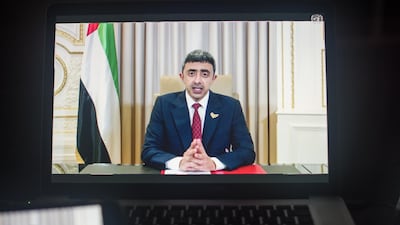As the UN’s 75th General Assembly comes to a close, Sheikh Abdullah bin Zayed, the UAE Minister of Foreign Affairs and International Cooperation, delivered an address yesterday that encapsulates the country’s vision for the future, highlighting opportunities and challenges that stand in the way of a more peaceful and prosperous Middle East.
Polarisation has increased in the Arab world, and conflicts, in the words of Sheikh Abdullah, have become “dangerously regionalised”. This trend has been particularly noticeable with respect to Turkish interventionism. From Libya to Syria and now on the border between Armenia and Azerbaijan, Ankara has espoused a bellicose approach to international affairs, taking advantage of regional instabilities to advance its own agenda.
Iran has also pursued a strategy of division, meddling in the domestic affairs of Arab nations and funding dangerous proxies. In Yemen, Tehran backs the Houthi rebels, who have waged war against the internationally recognised government for years, undermining efforts at finding a peaceful solution to the conflict. Iran also backs Lebanon’s Hezbollah, a powerful terrorist group that has sent the country into political deadlock even as it faces economic and social collapse. Curbing Tehran’s influence requires concerted diplomatic efforts that a flawed nuclear deal from which the US withdrew in 2018 did not deliver. A new deal is needed that limits Iran’s ballistic missile programme and prevents the regime from funding proxies.
"Despite these mounting global threats, the UAE believes that we can transform unprecedented challenges into great opportunities," Sheikh Abdullah told the General Assembly. He repeated the UAE’s support for a global ceasefire, which the UN had called for at the onset of the pandemic, and the country’s firm belief that peace is possible, from Libya to Yemen and Syria, through negotiations and the political process.
The UAE is a strong proponent of international co-operation and multilateralism. Last month, the Emirates became the third Arab country to establish diplomatic ties with Israel, in exchange for which Israel has agreed to halt the annexation of Palestinian land.
The Abraham Accord, as the peace agreement is known, has the potential to be a foundation for a more comprehensive regional peace that takes into account the need for Palestinian statehood and Israel’s security concerns.
Even as the world faces a global health crisis, an economic recession and rising tensions in the Middle East and beyond, there is still much cause for hope. The UAE has managed to overcome obstacles and continue planning for the future. For the Emirates, 2020 has been a year for planning for the country’s next 50 years, as it celebrates its 50th anniversary in 2021. This means investing in the future of education, agriculture and technology so that the UAE can be more self-reliant and prepare for a post-pandemic world. From launching a Mars probe to starting the first nuclear reactor in the Arab world, the UAE has made this a year of possibilities. The UAE has also set a mass Covid-19 testing campaign, which has helped to keep coronavirus cases under control and helped support various sectors.
Yet, overcoming difficulties takes time and preparation. As the pandemic has demonstrated, it also requires international co-operation and solidarity. The UAE has applied these lessons at home. As the region becomes increasingly divided, the success story of the Emirates can inspire others to follow in the nation’s footsteps and choose the path of peace.


